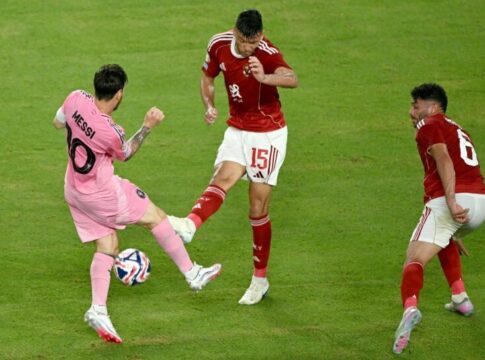In a spectacle billed as Lionel Messi’s grand entrance into the global arena with Inter Miami, it was instead Egypt’s Al Ahly that dominated both the pitch and the passion at Hard Rock Stadium in the much-anticipated opener of the 2025 FIFA Club World Cup.
The goalless draw belied a match teeming with intensity, drama, and a stark revelation: Inter Miami — despite the stardom of Messi, Luis Suárez, and Sergio Busquets — is not yet equipped for football’s elite stage.
The 11-time African champions Al Ahly, under newly appointed Spanish manager Jose Riveiro, controlled large spells of the match and were unlucky not to walk away with three points. A missed penalty by star winger Trézéguet and multiple squandered chances kept the scoreboard unflatteringly flat — but the performance did not go unnoticed.
“Al Ahly were disciplined, dynamic, and tactically superior,” said Middle East football analyst Mohamed El Sherei. “They turned what was supposed to be Inter Miami’s showcase into a warning shot to global football: Africa’s giants are no longer here to spectate.”
In the early minutes, the gap in tempo and physicality between the MLS and the CAF Champions League was clear. Inter Miami played with the fluidity of a preseason friendly, while Al Ahly applied relentless pressure, forcing defensive errors and exposing gaps in midfield transitions.
Messi and Suárez, repeatedly suffocated by Hamdi Fathi and Marwan Attia, found little room to operate. Inter’s defensive midfielders Tomás Avilés and Federico Redondo were both booked before halftime trying to stop Al Ahly counterattacks.
Goalkeeper Óscar Ustari was Inter’s saving grace, denying Trézéguet’s penalty in the 41st minute and making a string of saves that kept the Herons in the match. Yet, the numbers — and the narrative — leaned red.
In one of the evening’s more remarkable visuals, Hard Rock Stadium echoed with Egyptian chants long before kickoff. Al Ahly fans, draped in red, vastly outnumbered Miami locals, turning the Florida-based Club World Cup opener into a pseudo-away fixture for the host team.
“This is why we say Al Ahly is not just a club — it’s a nation,” said Tamer Youssef, an Egyptian-American fan who flew in from New Jersey. “To see Miami filled with Egyptians, with our drums and flags — it was historic.”
Inter Miami’s head coach Javier Mascherano, who had openly admitted pre-tournament that his side may struggle against such quality, was proven right. “The Club World Cup has a very high level, and it’s a level we clearly don’t have,” he said post-match. “There’s no shame in admitting it.”
Miami’s aging stars and underwhelming supporting cast couldn’t match Al Ahly’s cohesion and sharpness — despite Miami’s global branding and superstar payroll.
Adding to their woes, Mascherano’s calls for reinforcements ahead of the tournament went unanswered, due to front-office disarray and Major League Soccer’s restrictive roster rules. Miami entered the tournament without any new signings — a strategic error many observers now consider pivotal.
The second half saw a brief resurgence from Inter, with Messi testing Egyptian goalkeeper Mohamed El Shenawy with a close-range free kick and a curling shot in stoppage time — both of which were spectacularly denied. Still, Al Ahly held firm. Their disciplined defensive line, bolstered by Yasser Ibrahim and Mohamed Abdelmonem, absorbed late pressure and nearly stole the win on the counter.
The result leaves both teams trailing in Group B behind Portugal’s FC Porto and Brazil’s Palmeiras, who face off next. For Inter Miami, the outlook is grim. For Al Ahly, however, the draw feels more like a statement than a setback. “This team is dangerous,” warned former USMNT coach Bruce Arena, now a FOX Sports analyst. “They have the tactical maturity and physical intensity to go deep. I wouldn’t want to play them next.”
Al Ahly’s performance, both on and off the field, sends a loud message: African football is not just catching up — it’s here. With only two weeks under a new coach, their tactical edge and technical precision embarrassed a team with one of football’s greatest icons.
“This wasn’t just a draw,” said Egyptian football historian Dr. Yasser El-Kady. “It was symbolic — that Cairo’s red giants can outclass the glamour of global football.”


